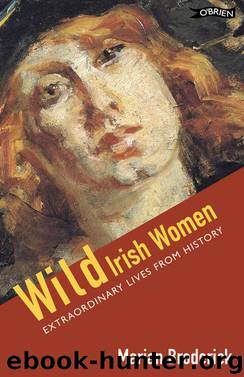Wild Irish Women by Marian Broderick

Author:Marian Broderick [Marian Broderick]
Language: eng
Format: epub
ISBN: 9781847174611
Publisher: The O'Brien Press
Published: 2012-11-15T16:00:00+00:00
Charlotte Despard
1844–1939
Philanthropist, suffragist and nationalist
Charlotte Despard was one of the Victorian era’s great eccentrics. A vegetarian, a Marxist, a Theosophist and a pacifist, she worked all her life towards three main aims: to change the law to improve the lot of London’s slum-dwellers, to achieve female suffrage in Britain and Ireland and to see Irish independence.
Charlotte was born on an estate in Kent, England, into a wealthy Norman-Irish dynasty. Her father, Captain William French, was an irascible naval officer; her mother, Margaret Eccles, a mentally unstable Scottish heiress. Charlotte had four sisters and a baby brother, John (later to become the lord lieutenant of Ireland). She suffered the sort of Victorian middle-class childhood in which she was expected to bring herself up. When she was ten years old, her father died; when she was fifteen her mother was committed to a lunatic asylum; when she was twenty-one, Charlotte found herself orphaned and wealthy.
The Frenches were a wayward, independent-minded family, and Charlotte was the most strong-willed of them. From her very early years she had a determined, free-spirited nature, and she hated authority of any kind. At twenty-six she met and quickly married a man from an identical background, Maximillian Despard, and lived with him in India and London. Charlotte and Max were an odd couple: where he was calm, she was passionate; where he was cautious, she was spontaneous; where he was calculating, she was reckless. Despite their differences, it was a happy marriage, although Charlotte deeply regretted that they did not have any children.
In 1890, after twenty years as a wife, Charlotte became a widow. She grieved for several months and then threw herself into the cosmetic and largely useless charitable works expected of all rich widows, such as sending flowers to the poor and visiting the sick. From these beginnings, within a year of Max’s death, she began a process that would transform her from a well-meaning pillar of genteel society into a radical force for reform.
Charlotte, who could afford to live anywhere she chose, chose to live in Wandsworth, one of the roughest parts of south London. She had conceived a desire to be among the poor and, as she watched the sickly, stunted children wandering the streets in winter, she felt a need to help them directly. She opened her own home to provide basic medical help for the children of the area, then a basic play area for them, which eventually developed into the Despard Club. A couple of years later she moved to an even rougher part of London, Nine Elms, and started a second Despard Club among the poverty-stricken London-Irish.
Through this hard work, Charlotte started to get interested in the English workhouse system. The Poor Laws Act (1834) regarded poverty as a moral failing and gave no relief to the able-bodied poor, except that which could be ‘earned’ by labouring in workhouses. These were institutions where everyone was thrown in together – if you wanted help, you had to live there, usually in atrocious and degrading conditions.
Download
This site does not store any files on its server. We only index and link to content provided by other sites. Please contact the content providers to delete copyright contents if any and email us, we'll remove relevant links or contents immediately.
A Dictionary of Sociology by Unknown(3085)
The Art of Dramatic Writing: Its Basis in the Creative Interpretation of Human Motives by Egri Lajos(3067)
The Dictionary of Body Language by Joe Navarro(2996)
0041152001443424520 .pdf by Unknown(2845)
How The Mind Works by Steven Pinker(2816)
Day by Elie Wiesel(2782)
Merriam-Webster's Collegiate Thesaurus, Second Edition by Merriam-Webster Inc(2758)
The Meaning of the Library by unknow(2571)
The Official Guide to the TOEFL Test by ETS(2331)
A History of Warfare by John Keegan(2243)
The Emotion Thesaurus: A Writer's Guide to Character Expression by Puglisi Becca & Ackerman Angela(2144)
Emotion Amplifiers by Angela Ackerman & Becca Puglisi(2035)
MASTER LISTS FOR WRITERS: Thesauruses, Plots, Character Traits, Names, and More by Bryn Donovan(1943)
Merriam-Webster's Pocket Dictionary by Merriam-Webster(1934)
The Cambridge Guide to English Usage by PAM PETERS(1913)
Star Wars The Rise of Skywalker The Visual Dictionary by Pablo Hidalgo(1899)
More Than Words (Sweet Lady Kisses) by Helen West(1867)
Lucky Jim by Kingsley Amis(1750)
American Accent Training by Ann Cook(1660)
